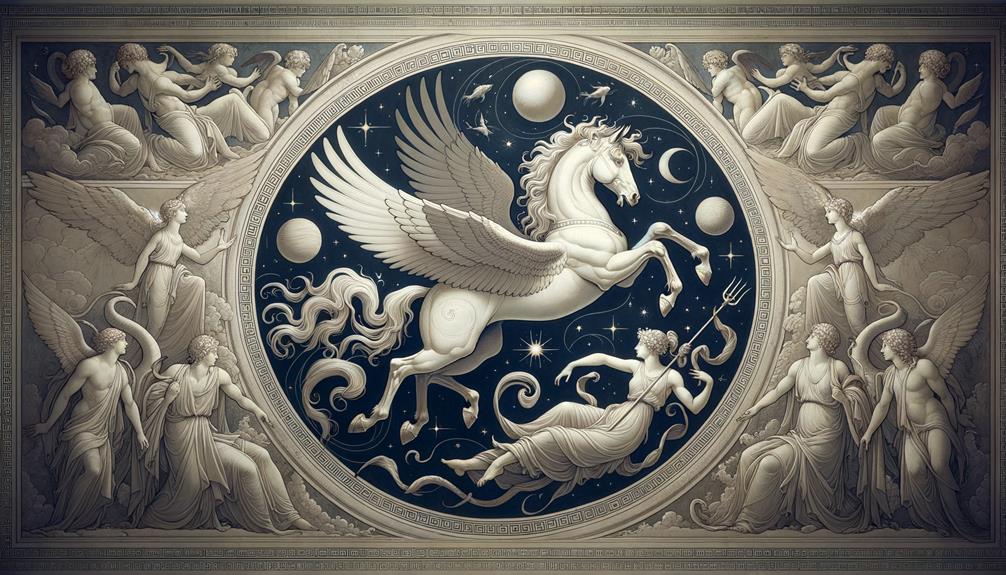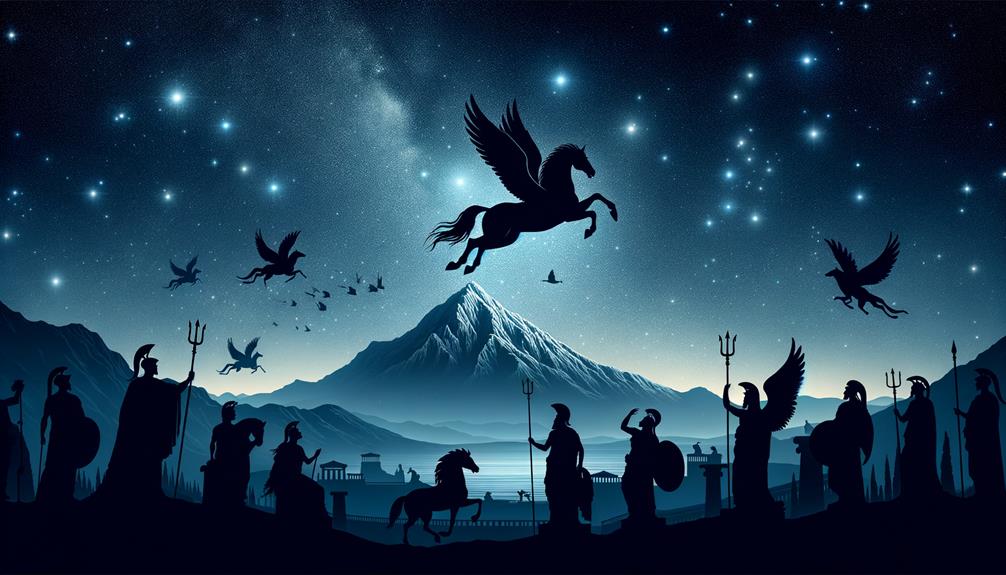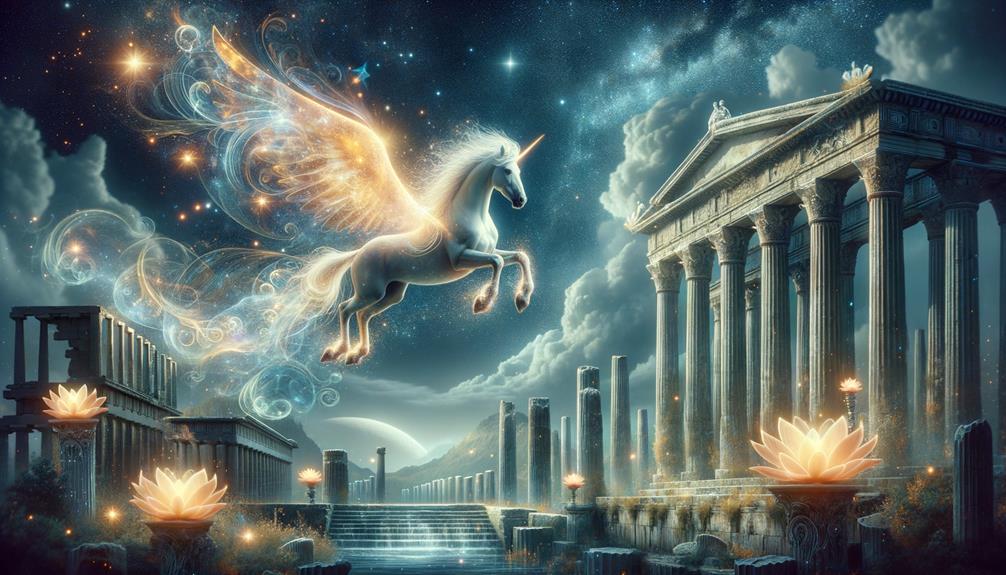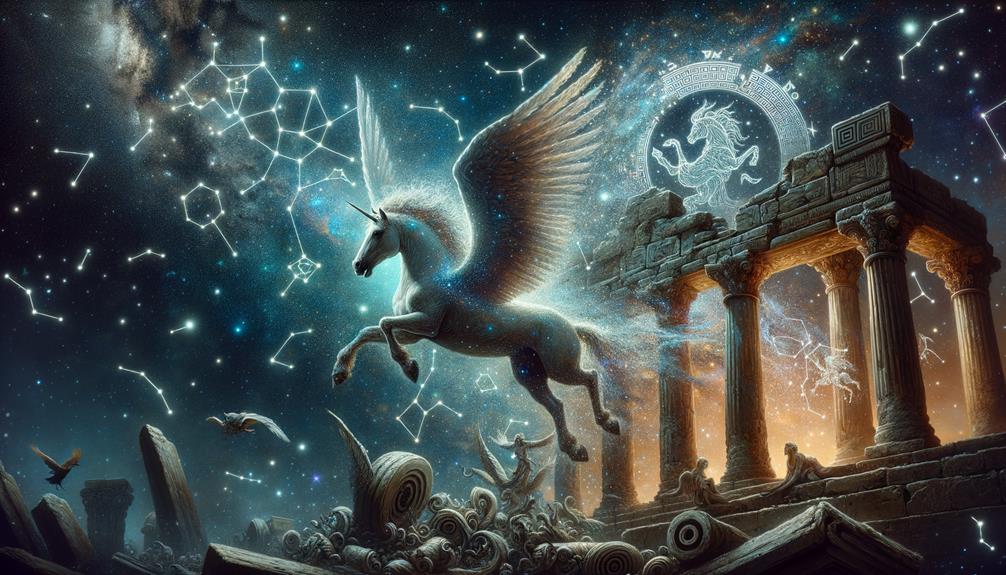Some might brush off Pegasus legends as old, whimsical stories, but I see them as much more than that. They're deeply symbolic and reflect important cultural viewpoints. As a seasoned mythologist, I've invested a lot of time pulling apart these tales, inspecting the complex layers of meaning hidden within the story of this impressive, winged horse. Let's take a closer look, using a detailed approach, and trek through the ancient Greece, digging into the origins, symbolism, and cultural relevance of Pegasus.
These legends are a rich source of enduring wisdom that still makes sense today. As we peel back the layers, you'll see that they offer valuable insights that still hold true. I promise, by the time we're done with our exploration, you'll see this mythical creature in a whole new light, uncovering a depth you might not have expected.
Pegasus: Origin and Etymology

Let's take a closer look at the origins of 'Pegasus'. Interestingly, this name originates from the Greek term 'pēgē', which means 'spring'. There's also a potential link to the Luwian language, associating it with the Anatolian weather god Pihassasi. The relationship between Pegasus and springs is quite fascinating, especially considering the mythical horse's close connection to water in Greek mythology.
In the world of mythology, Pegasus is often seen as a symbol of unrestrained life – a high point of magical manifestation. The story of Pegasus' birth, emerging from Medusa's blood, adds intriguing depth to its myth. As a winged horse, Pegasus' ability to fly sets it apart from ordinary, land-bound horses, raising its stature to something more divine and heavenly.
Pegasus' ties to the Muses and its dwelling on Mount Olympus further solidify its significance in Greek mythology. Pegasus's rich mythological narrative, full of divine connections and symbolic interpretations, shows us why it remains relevant, even in the 21st century. Pegasus is more than just a mythical being – it embodies aspiration, freedom, and the transformative power of the imagination.
Pegasus Iconography and Family

Let's dive into the fascinating world of Pegasus, the immortal winged horse from Greek mythology. His iconic figure and intricate family relations add layers to his legendary tale. Pegasus stands for inspiration, prosperity, and the power of positive thinking.
| Iconography | Family | Significance |
|---|---|---|
| Winged | Poseidon, Medusa | Godly heritage, freedom |
| Pure White | Chrysaor, Geryon | Innocence, purity |
| Zeus's Thunder-carrier | Power, authority | |
| Associated with Springs | Inspiration, life |
Being the offspring of god Poseidon and Medusa, Pegasus is known for his heavenly journeys, connecting the sky and the earth. His brothers, Chrysaor and Geryon, also contribute to his fascinating lineage. Pegasus has a strong link to springs such as Hippocrene and Peirene, which further attests to his symbolic representation of inspiration and the flow of creativity.
Pegasus's dwelling on Mount Olympus, where he served as Zeus's thunder-carrier, highlights his esteemed status in Greek mythology. But his influence isn't limited to ancient times. The majestic winged horse continues to inspire the modern world, symbolizing the freedom to live without constraints and overcome challenges.
The legend of Pegasus conveys a deep message: freedom, inspiration, and prosperity are within our reach if we, like Pegasus, dare to soar high.
Role of Pegasus in Greek Mythology

In the fascinating world of Greek mythology, the figure of Pegasus, a horse with wings, plays a significant role. He's not just a mythical creature; he represents freedom, the ability to overcome ordinary limits, and the spark of poetic creativity. His origin story tells us he sprang from the blood of Medusa, and was eventually mastered by the hero Bellerophon, who used a golden bridle gifted by the temple of Athena.
Together, Bellerophon and Pegasus achieved remarkable feats, including the defeat of the terrifying Chimera. However, Bellerophon's overconfidence led him to his doom. He tried to fly up to the gods on Mount Olympus, only to be thrown off by Pegasus. The horse, free of his human companion, kept flying upwards and was accepted among the gods as the carrier of Zeus' thunderbolts.
But Pegasus was more than just a partner in battles. Legends say that where his hoof struck the ground, springs bubbled up, like Hippocrene and Peirene. These places were linked with the spark of poetic creativity. The divine connections of the horse and his ability to fly made him a powerful symbol of overcoming limits and artistic creativity.
In the intricate web of Greek mythology, Pegasus is an essential character. His story sends a deep message about the fine line between being a hero and being arrogant, the importance of creativity, and the irresistible charm of freedom. His legend continues to echo, reminding us of the enduring relevance of these themes.
Pegasus Symbolism and Spiritual Meaning

Pegasus, the winged horse from Greek mythology, isn't just an interesting character from ancient tales. His symbolism and spiritual significance can deepen our understanding of his role and impact. Pegasus was born near the springs of Mount Helicon, and he embodies the liberation and ascension that are possible when we unchain our imagination and dreams. As the story of Bellerophon shows, riding Pegasus was like a ticket to dwell with the gods. It's a metaphor for our own capacity to connect with our higher self and draw good luck.
Pegasus is more than freedom and dreams. He's also about overcoming challenges. Remember the story where Zeus sent a gadfly to sting Pegasus? Bellerophon fell off, but Pegasus didn't stop. He continued his climb, a testament to perseverance. When Pegasus hit his hoof on Mount Helicon, eternal springs appeared. This act is a symbol of the combined beauty and strength that can inspire us.
Let's break down some of the key symbols and their meanings:
| Symbol | Spiritual Meaning | Mythological Context |
|---|---|---|
| Freedom and ascension | Connection with the higher self | Born near the springs of Mount Helicon |
| Overcoming challenges | Resilience | Zeus sent a gadfly; Bellerophon fell |
| Eternal springs | Mix of beauty and strength that inspires | Struck his hoof on Mount Helicon |
| Dwelling with the gods | Realizing one's dreams | Bellerophon's dream to ride Pegasus |
Pegasus in Contemporary Culture

Pegasus, the mythical winged horse, has left an undeniable imprint on our modern culture. You'll find references to this fascinating creature across a range of media, from movies and literature to video games and even company logos. Born from the blood of Medusa, Pegasus has been sparking the imaginations of people for countless years. Its ties to water springs, especially those on Mount Helicon, have come to symbolize creative energy and inspiration.
In mythology, Pegasus played a crucial part in the adventures of Bellerophon, aiding him in defeating a mighty sea monster. Modern tales often revisit this story, underscoring themes of bravery, heroism, and the risks of arrogance.
Over the years, the symbolism of Pegasus has grown and evolved. Yet, it still stands for the idea of leading a life without limits, in sync with our best selves. Pegasus encourages us to picture the life we're meant to live – a life full of abundance, inspiration, and freedom. Its lasting presence in our culture serves as a reminder that our creative minds and imaginations can help us overcome even the most overwhelming obstacles. Pegasus continues to uplift and inspire us, remaining a key figure in our shared cultural awareness.
Frequently Asked Questions
What Is the Legend Behind Pegasus?
Hey, have you ever wondered about the story of Pegasus? It's a fascinating tale from ancient Greek mythology. Pegasus was born from the blood of Medusa and the coupling of Poseidon, which links him to water and springs. Bellerophon, a human hero, was the one who managed to tame this mythical creature. Pegasus has become a symbol of freedom, creativity, and inspiration, and you can see this influence across various forms of art. Isn't that intriguing?
What Does a Pegasus Mean Spiritually?
When we talk about Pegasus in a spiritual sense, we're really talking about boundless freedom, the spark of creativity, and connecting with the best version of ourselves. This mythical creature stands for breaking free from the norm, opening ourselves up to new possibilities, and cultivating self-appreciation. It's a beautiful reminder to live our lives true to our core and not as others would have us be.
Who Killed Pegasus?
Actually, it's a bit of a misnomer to say that Pegasus was killed in mythology. What happened was that Bellerophon, in his ambition, attempted to ride Pegasus all the way to Olympus. But, Pegasus wasn't having any of it and tossed Bellerophon off his back. However, Pegasus himself made it to the dwelling of the gods. The story goes that Zeus, impressed by Pegasus, transformed him into a constellation.
What Mythical Creature Is Flying Pegasus?
Pegasus is a creature of myth, often imagined as a horse with wings. This fantastic beast, born from the spilled blood of Medusa, is famous for its ability to soar through the skies. In many tales and legends, Pegasus stands as a symbol of inspiration, freedom, and the realization of dreams.

